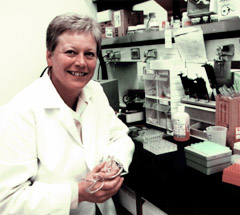
As a Research Associate in an analytical chemistry lab, Colette Boucher
prepares potential drug compounds for testing and analysis. This process
consists of weighing an appropriate sample, perhaps mixing it with a solvent
or other compound, cleaning and calibrating equipment, and ensuring that
the computer software controlling the experiment functions properly.
|
 |
 |
 |
Colette insists on a challenge, and she doesn’t like routine. That’s
why she gravitated to her current employer. The Bio-Méga research
division of Boehringer Ingelheim Canada conducts anti-viral biology
research for all of Canada’s pharmaceutical giants, as well as other
clients worldwide. In Colette’s opinion, this makes her job very
interesting.
After a specific time period, anywhere from one to five years of
searching for a new inhibitor for a specific virus, for example,
they might decide to move on. As Colette says, "if we haven’t found
a new compound after some years of research, it might not make sense
to continue." That’s just long enough to learn a lot about how a
specific virus - the HIV virus, for instance - reacts to specific
types of compounds. Then Colette’s focus changes to another virus
- the flu, perhaps - with totally different behaviours.
Although Colette still performs the same functions - preparing compounds,
calibrating instruments, and verifying software - the tools and
the order in which they are used changes depending on the results.
"In a quality control centre, you have to follow protocol," she
says. "In a research lab like mine, you create protocol."
Although her experiments usually confirm that a specific compound
provided to her by an organic chemist behaves as anticipated, Colette
prefers those rare times when something goes wrong - when a compound
doesn’t do what’s expected, or an instrument isn't responding properly.
That’s when she has a chance to test new technologies, consult experts,
or check the scientific literature for solutions. |
 |
| |
|
|


